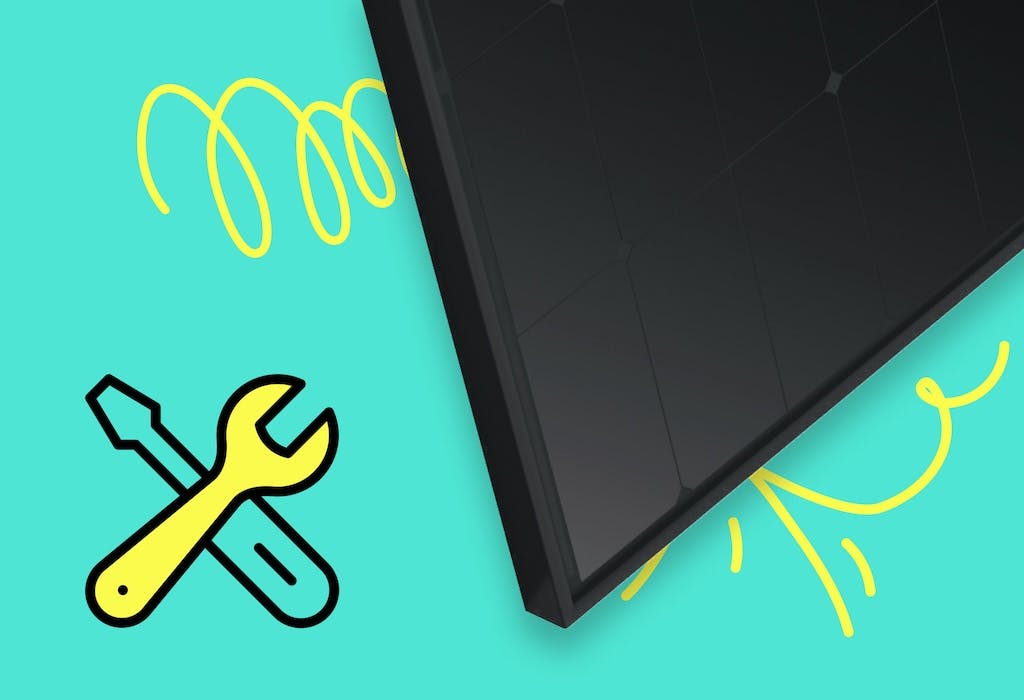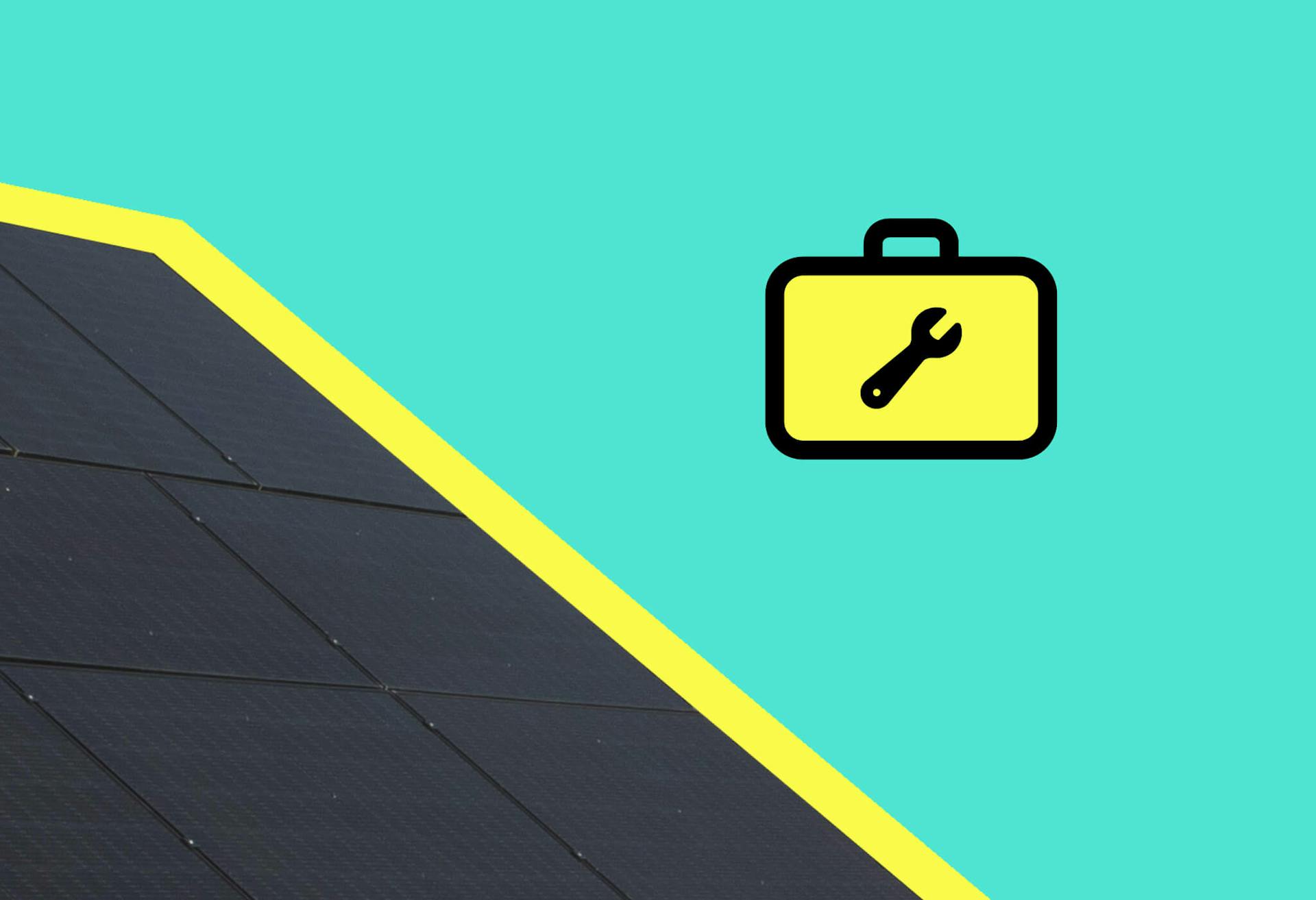- Solar advice hub
- Maintenance
- Can solar panels be recycled?
Can solar panels be recycled?
Learn about the nuts & bolts of solar panel recycling, including how it happens and where it happens.


Why you can trust our content
We know that the solar industry is full of misinformation, but we only use reliable sources, including:
- Our experienced solar experts, installers and system designers
- Our own database of solar & battery system designs
- Authoritative bodies like MCS and the UK government




Calculate savings
What kind of home do you live in?
Calculate savings
What kind of home do you live in?
Solar panel recycling: at a glance
Tens of millions of solar panels have been installed across the UK, with millions more to come in the next decades.
To have the best effect on the planet possible, and to keep costs down, they'll have to be recycled – and fortunately, we have the legal and technological capabilities to do so.
In this guide, we'll explain how you can recycle your solar panels, when you should start the process, and what it all involves.
If you’re wondering how much you could save with a solar & battery system, enter a few details below and we’ll provide an estimate.
Find out how much you can save
What kind of home do you live in?
Are solar panels recyclable?
Solar panels can be recycled, and are currently being recycled in sites across the world.
This is crucial for maintaining solar panels' green credentials, and will only grow more important as the amount of global solar panel waste increases over the coming decades.
By 2050, the world will have to deal with 28 to 40 million tons of photovoltaic end of life (PV EOL) waste, according to a DNV white paper from 2023.
The report outlined that all together, this waste would take up about one square kilometre – enough space to fit 140 football pitches, or about half of London's Soho district.
As this waste accumulates, it should be recycled quickly and efficiently. Thankfully, there companies are popping up across the UK to deal with the issue.
But when do solar panels need to be recycled?
Modern monocrystalline solar panels should last 30-40 years, though this may be a conservative estimate!
After all, a 3.46 kilowatt-peak (kWp) solar panel system installed at Germany's Oldenburg University in 1976 is still generating more than 3,000 kilowatt-hours (kWh) of electricity per year.
All solar panels experience a gradual decline in their efficiency over time, but even after a few decades, they should generate plenty of electricity.
Manufacturers routinely guarantee well above 80% of a panel's initial performance after 30 or even 40 years, which means your panels should still be significantly cutting your energy bills for ages to come.
In this situation, the idea of getting rid of your panels and buying new ones may not be very appealing, especially as you'll have to pay for the panels to be removed before they’re taken away.
The emergence of a solar recycling industry is less to do with modern-day panels, and more of a response to the older generation of polycrystalline solar panels reaching the end of their useful lifespan.
These panels started to be widely installed across the UK in 2011, and many of them have stopped producing a substantial amount of electricity by this point.
Verified expertThere have been recent breakthroughs in solar panel recycling, so the metals in the old panels are now much easier to remove and use again. This is so important because we want to keep driving down the initial carbon footprint of renewable products – so if we can reuse old materials instead of mining for new ones, this gives us a great boost.
David Lindsay
Managing Director of Certi-fi Schemes Limited
David has been Managing Director of Certi-fi Schemes since 2017, overseeing EPVS and Flexi-Orb
How can you recycle your solar panels in the UK?
In the UK, it's straightforward to get your solar panels recycled.
Under the Waste Electrical and Electronic Equipment (WEEE) regulations, manufacturers, sellers, and importers must be part of a producer compliance scheme (PCS), like PV CYCLE.
The EU enacted the original WEEE directive in 2003, and it's been part of UK law as the WEEE Regulations since then. That didn't change when the UK left the EU.
Your solar panel 'producer' is legally required to take your solar waste. 'Producer' is the term used in the WEEE Regulations, and usually refers to the company you bought your panels from.
If the producer is a small company or only operates online, it can pay for a government-approved Distributor Take Back Scheme (DTS) to collect and recycle your panels.
You can contact your producer to arrange for your old system to be taken away and recycled, though you will have to separately arrange (and probably pay) for your panels to be removed from your roof.
The producer will then transport the panels to a Designated Collection Facility (DCF).

What if your installer has gone bust?
If your installer doesn't exist anymore, get in touch with a Producer Compliance Scheme (PCS) in your area, which the UK government has listed here.
You can choose from the following PCSs, based on where you live:
If you don't know which PCS your company joined before it went under, contact one from the list above, and the people there should be able to point you in the right direction.
A PCS may hire other companies to do the physical activity of collecting the panels and dropping them off at a Designated Collection Facility, but either way, it'll get done.
As a general rule, don't expect any of these PCSs to remove panels from your roof. You'll probably have to hire a professional to carry out this de-installation, as it's too dangerous to attempt it yourself.
Designated Collection Facilities
Your PCS will have a contract with a DCF that allows it to drop off solar waste there, before the equipment goes on to be recycled.
A DCF often has contracts with multiple different PCSs, but generally only one that deals with solar panels.
These DCFs usually form part of a local authority's recycling or disposal centre, and most local authorities are now on board, to the extent that there are now more than 100 DCFs that accept solar waste.
Here are some of those facilities, according to the government, in places as varied as Belfast, Sheffield, and Cardiff.
| Local authority | PCS |
|---|---|
| Belfast City Council | Recolight |
| Bristol City Council | REPIC |
| Cardiff County Council | ERP |
| Devon County Council | Valpak |
| Glasgow City Council | Valpak |
| Greater Manchester Waste Disposal Authority | REPIC |
| Leeds | WEEE Link |
| Newcastle-upon-Tyne City Council | Valpak |
| North London Waste Authority | ERP |
| Sheffield | Veolia |
Solar panel recycling plants
Panels are then sent to an approved authorised treatment facilities (AATF) that accepts solar waste, to be recycled.
There's no government database of these facilities, but here are some of the ones currently in operation.
Some of them have started recently, including SolRecycle – which engineer Irina Boldurescu founded in 2023 – and Pravas Sustainable Technologies, which began recycling panels in 2024.
| Name | Location |
|---|---|
| Solar Recycling Solutions | Kent |
| Waste Experts | Huddersfield |
| PV Recycling | Northampton |
| SolRecycle | Manchester |
| MG Waste Management | Manchester | Pravas Sustainable Technologies | Worcester |
How many solar panels will need recycling?
More than 1.6 million UK homes have solar panels – and all but a few thousand of them have had them installed since 2010.
This means that even if domestic solar installations stopped today, there'd still be tens of millions of panels that'd need to be recycled in the coming decades.
And with an increasing number of households switching to solar, this number will keep climbing every year.
The International Renewable Energy Agency (IRENA) has predicted that the UK will generate 30,000 tonnes of solar waste per year by 2030, and 350,000 tonnes by 2040.
This forecast is somewhat flawed, as it's from 2016, and is based on solar panels needing recycling after 20 years, instead of the 30-40 years that modern panels last.
Despite probably being an overestimation, it still shows the rough scale of the challenge facing us.
How are solar panels recycled?
Recycling solar panels involves several key steps to ensure that valuable materials are recovered and reused. Here they are:
- The removal of the aluminium frame comes first. This edging is fully recyclable and relatively easy to detach. The cable connector block is also taken off.
- The laminated surface bond is broken. To achieve this, the panels are first cut into chunks, then crushed into small pieces, usually measuring 6-10mm.
- The semiconductor films are removed from the glass. This is usually carried out in a rotating leach drum, in a process that takes four to six hours and involves sulphuric acid and hydrogen peroxide being added to the glass.
- The glass is separated. A classifier separator removes the sulphuric acid and hydrogen peroxide from the glass, before a vibrating screen separates the glass from larger laminated pieces made of Ethylene Vinyl Acetate. The glass is cleaned and moved into recycling containers.
- The solar cells are heated to around 500°C. Solar panels are well-guarded against weather effects, but these protective layers make recycling harder, and high temperatures are often required to separate the parts. This process, known as pyrolysis, evaporates the plastic components and leaves behind the silicon wafers. The silicon is then etched away chemically, allowing it to be purified and reused.
- The remaining metals are gathered. This takes place in three stages, during which professionals use sodium hydroxide to gradually increase the pH level. When they've separated and are ready to be gathered, the metals are sent off to be used in new panels.
The great majority of materials in a solar panel can be recycled. The recycling industry routinely handles glass, aluminium, and copper, and the plastic junction box also poses no challenges.
That's why up to 99% of the materials in a solar panel are recyclable, according to trade association Solar Energy UK.
Extracting precious materials from solar panels
Recycling solar panels isn't just about being green; it's also about recovering its valuable contents, like silicon, silver, and copper.
Nicolas Defrenne, of French solar recycling firm Soren, told BBC News: "Over 60% of the value is contained in 3% of the weight of the solar panels."
Silver makes up a large part of this value, especially with its price currently soaring alongside demand.
In April 2025, the International Precious Metals Institute (IPMI) stated: "This moderate shortage and elevated silver price will last for a long time."
Solar manufacturers require massive quantities of silver, which exacerbates the situation. The solar industry accounted for "19% of all worldwide silver metal demand in 2024," according to the IPMI.
This could present issues for solar panel production moving forwards, as companies work out how to cut the amount of silver in their products.
Extracting silver from used solar panels and recycling it into new modules is a vital way to keep the wheels turning in the meantime – and it may also represent a long-term solution.
Soren is ultimately aiming for a world in which new solar panels are made of nearly three-quarters recycled materials. This would speed up production, reduce mining, and cut expenses.
Solar panel recycling around the world
There are several notable companies that are driving progress in the solar recycling industry – and France plays host to two of them.
French utilities company Veolia launched Europe’s first solar recycling plant in 2018 , and by 2021, it was processing 4,000 metric tons of material per year.
Then in 2023, specialist solar recycling company ROSI (Return of Silicon) opened a pioneering large-scale industrial solar recycling plant in Grenoble, in south-east France.
The factory aims to recycle 99% of each solar panel's constituent parts, by avoiding the industry standard of shredding panels.
This low-cost technique extracts glass, polymers, and some of the metals, without damaging more expensive materials like silver and silicon.
ROSI uses precision recycling treatments that involve thermal and soft chemical etching to get even more out of each panel.
And Venetian startup 9-Tech has developed a more eco-friendly way to recycle solar panels.
The company manages to remove materials that make up 95% of each panel's value, without using any toxic chemicals or releasing any pollutants into its surroundings.
To achieve this, team members use techniques such as an acid bath combined with ultrasound waves to separate silver from silicon.
9-Tech is aiming to open a plant that processes more than 4,000 tons of material, using these green methods.
Summary
Millions of tons of solar panel waste are incoming – and fortunately we have the tools to deal with it.
Capacity will need to grow massively to keep up with the increased demand for recycling services, but the technology to extract 99% of a panel's material is already in use.
And thankfully, modern solar panels last 30-40 years, which means we have time to build many more factories.
Opening enough recycling plants to deal with the upcoming tsunami of old panels is also the best way to tackle the rising price of silver, as well as the environmental cost of mining.
If you'd like to see the savings you could get from a solar & battery system, just answer a few questions below, and we’ll provide an estimate.
Find out how much you can save
What kind of home do you live in?
Solar panel recycling: FAQs
Related articles

Written byJosh Jackman
Josh has written about the rapid rise of home solar for the past six years. His data-driven work has been featured in United Nations and World Health Organisation documents, as well as publications including The Eco Experts, Financial Times, The Independent, The Telegraph, The Times, and The Sun. Josh has also been interviewed as a renewables expert on BBC One’s Rip-Off Britain, ITV1’s Tonight show, and BBC Radio 4 and 5.






